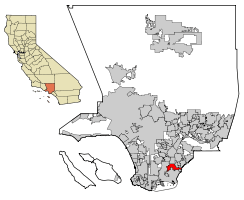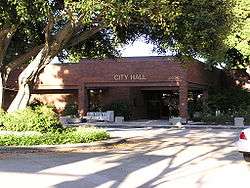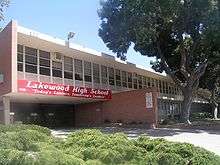Lakewood, California
| Lakewood, California | ||
|---|---|---|
| General law city[1] | ||
| City of Lakewood | ||
|
Lakewood City Hall, 2005 | ||
| ||
| Motto: Tomorrow's City Today | ||
 Location of Lakewood in Los Angeles County, California | ||
 Lakewood, California Location in the United States | ||
| Coordinates: 33°50′51″N 118°7′12″W / 33.84750°N 118.12000°WCoordinates: 33°50′51″N 118°7′12″W / 33.84750°N 118.12000°W | ||
| Country |
| |
| State |
| |
| County |
| |
| Incorporated | April 16, 1954[2] | |
| Government | ||
| • Mayor | Ron Piazza[3] | |
| Area[4] | ||
| • Total | 9.466 sq mi (24.517 km2) | |
| • Land | 9.415 sq mi (24.384 km2) | |
| • Water | 0.051 sq mi (0.133 km2) 0.54% | |
| Elevation[5] | 46 ft (14 m) | |
| Population (2010) | ||
| • Total | 80,048 | |
| • Density | 8,500/sq mi (3,300/km2) | |
| Time zone | Pacific (UTC-8) | |
| • Summer (DST) | PDT (UTC-7) | |
| ZIP codes | 90711–90716, 90805[6] | |
| Area code | 562[7] | |
| FIPS code | 06-39892[8] | |
| GNIS feature IDs | 1660883,[5] 2411613 | |
| Website |
www | |
Lakewood is a city in Los Angeles County, California, United States. The population was 80,048 at the 2010 census. It is bordered by Long Beach on the west and south, Bellflower on the north, Cerritos on the northeast, Cypress on the east, and Hawaiian Gardens on the southeast. Major thoroughfares include Lakewood (SR 19), Bellflower, and Del Amo Boulevards and Carson and South Streets. The San Gabriel River Freeway (I-605) runs through the city's eastern regions.
Sometimes called "an instant city" because of its origins—going from lima bean fields in 1950 to a well-developed city by 1960—Lakewood is a classic example of a post–World War II American suburb.
History and notable features
Lakewood is a planned, post-World War II community.[9] Developers Louis Boyar, Mark Taper and Ben Weingart are credited with "altering forever the map of Southern California."[9] Begun in late 1949, the completion of the developers' plan in 1953 helped in the transformation of mass-produced housing from its early phases in the 1930s and 1940s to the reality of the 1950s.[9]
WWII veterans could get home loans with no down payment and a 30-year mortgage at only 4 percent interest. On the first day of sales, on March 24, 1950, an estimated 30,000 people lined up to walk through a row of seven model houses. By the end of April, more than 200,000 people had flocked to the Lakewood Park sales office and more than 1,000 families had purchased homes - 30-a-day on average. Once, 107 homes sold in just one hour. Monthly cost was only $44 to $56, including principal, interest and insurance.
The building of Lakewood broke records and made Lakewood the talk of the nation. Empty fields became 17,500 houses in less than three years. A new house was completed every 7 1/2 minutes, 40 to 60 houses per day, with a record 110 completed in a single day.[10]
The feel of this transformation from the point of view of a resident growing up in Lakewood was captured by D. J. Waldie in his award-winning memoir, Holy Land: A Suburban Memoir.
Lakewood's primary thoroughfares are mostly boulevards with landscaped medians, with frontage roads on either side in residential districts. Unlike in most similar configurations, however, access to the main road from the frontage road is only possible from infrequently spaced collector streets. This arrangement, hailed by urban planners of the day, is a compromise between the traditional urban grid and the arrangement of winding "drives" and culs-de-sac that dominates contemporary suburban and exurban design.
As the unincorporated Lakewood grew from a small village in 1950 to a community of more than 70,000 residents in less than three years, so grew its municipal needs. Lakewood thus had three choices: become annexed to nearby Long Beach, remain unincorporated and continue to receive county services, or incorporate as a city. In 1954, residents chose the latter option and voted to incorporate as a city, the largest community in the country ever to do so and the first city in Los Angeles County to incorporate since 1939. Lakewood is credited as a pioneer among California cities in services provision. Although it is an incorporated city, Lakewood contracts for most municipal services, with most of these provided by Los Angeles County and, to a lesser extent, by other public agencies and private industry. Lakewood was the first city in the nation to contract for all of its municipal services when it incorporated as a municipality in 1954, making it the nation's first "contract city." Many other Los Angeles suburbs, such as Cerritos and Diamond Bar, have adopted the "Lakewood Plan."
Lakewood is the home of the first Denny's Restaurant. In 1953 Harold Butler founded Danny’s Donuts, which was renamed Denny's Restaurant in 1959.
Lakewood was named Sports Illustrated's "Sportstown USA" in 2005 for the State of California.
Geography
Lakewood is located at 33°50′51″N 118°7′12″W / 33.84750°N 118.12000°W (33.847365, -118.119889) near Long Beach.[11]
According to the United States Census Bureau, the city has a total area of 9.5 square miles (25 km2). 9.4 square miles (24 km2) of it is land and 0.1 square miles (0.26 km2) of it (0.54%) is water.
Demographics
| Historical population | |||
|---|---|---|---|
| Census | Pop. | %± | |
| 1960 | 67,126 | — | |
| 1970 | 83,025 | 23.7% | |
| 1980 | 74,511 | −10.3% | |
| 1990 | 73,557 | −1.3% | |
| 2000 | 79,345 | 7.9% | |
| 2010 | 80,048 | 0.9% | |
| Est. 2015 | 81,611 | [12] | 2.0% |
2010
The 2010 United States Census[14] reported that Lakewood had a population of 80,048. The population density was 8,456.4 people per square mile (3,265.0/km²). The racial makeup of Lakewood was 44,820 (56.0%) White (40.9% Non-Hispanic White),[15] 6,973 (8.7%) African American, 564 (0.7%) Native American, 13,115 (16.4%) Asian (8.1% Filipino, 1.5% Korean, 1.4% Chinese, 1.4% Cambodian, 1.2% Vietnamese, 0.7% Japanese, 0.6% Indian, 0.4% Thai), 744 (0.9%) Pacific Islander, 9,249 (11.6%) from other races, and 4,583 (5.7%) from two or more races. In addition, there were 24,101 (30.1%) Hispanic or Latino residents of any race; 24.1% of Lakewood's population was of Mexican ancestry.
The Census reported that 79,939 people (99.9% of the population) lived in households, 109 (0.1%) lived in non-institutionalized group quarters, and 0 (0%) were institutionalized.
There were 26,543 households, out of which 10,649 (40.1%) had children under the age of 18 living in them, 14,711 (55.4%) were opposite-sex married couples living together, 3,975 (15.0%) had a female householder with no husband present, 1,696 (6.4%) had a male householder with no wife present. There were 1,262 (4.8%) unmarried opposite-sex partnerships, and 283 (1.1%) same-sex married couples or partnerships. 4,719 households (17.8%) were made up of individuals and 1,965 (7.4%) had someone living alone who was 65 years of age or older. The average household size was 3.01. There were 20,382 families (76.8% of all households); the average family size was 3.41.
The population was spread out with 19,476 people (24.3%) under the age of 18, 7,593 people (9.5%) aged 18 to 24, 22,117 people (27.6%) aged 25 to 44, 21,776 people (27.2%) aged 45 to 64, and 9,086 people (11.4%) who were 65 years of age or older. The median age was 37.5 years. For every 100 females there were 94.3 males. For every 100 females age 18 and over, there were 90.8 males.
There were 27,470 housing units at an average density of 2,902.0 per square mile (1,120.5/km²), of which 19,131 (72.1%) were owner-occupied, and 7,412 (27.9%) were occupied by renters. The homeowner vacancy rate was 1.1%; the rental vacancy rate was 5.7%. 57,591 people (71.9% of the population) lived in owner-occupied housing units and 22,348 people (27.9%) lived in rental housing units.
During 2009–2013, Lakewood had a median household income of $77,786, with 8.1% of the population living below the federal poverty line.[15]
2000
As of the census[8] of 2000, there were 79,345 people, 26,853 households, and 20,542 families residing in the city. The population density was 8,414.8 inhabitants per square mile (3,248.7/km²). There were 27,310 housing units at an average density of 2,896.3 per square mile (1,118.2/km²). The racial makeup of the city was 62.67% White, 7.34% Black or African American, 0.60% Native American, 13.51% Asian, 0.62% Pacific Islander, 10.10% from other races, and 5.17% from two or more races. Hispanic or Latino of any race were 22.78% of the population.
There were 26,853 households out of which 38.0% had children under the age of 18 living with them, 57.8% were married couples living together, 13.4% had a female householder with no husband present, and 23.5% were non-families. 18.4% of all households were made up of individuals and 8.2% had someone living alone who was 65 years of age or older. The average household size was 2.95 and the average family size was 3.37.
In the city the population was spread out with 27.5% under the age of 18, 8.1% from 18 to 24, 31.1% from 25 to 44, 21.4% from 45 to 64, and 11.9% who were 65 years of age or older. The median age was 35 years. For every 100 females there were 93.9 males. For every 100 females age 18 and over, there were 90.1 males.
The median income for a household in the city was $58,214, and the median income for a family was $63,342. Males had a median income of $45,447 versus $35,206 for females. The per capita income for the city was $22,095. About 5.6% of families and 7.4% of the population were below the poverty line, including 9.3% of those under age 18 and 7.1% of those age 65 or over.
Economy
Lakewood Center is located in Lakewood.
Top employers
According to the City's 2014-2015 Comprehensive Annual Financial Report,[16] the top employers in the city are:
| # | Employer | # of Employees | Total employment |
|---|---|---|---|
| 1 | Long Beach Unified School District | 909 | 5.35% |
| 2 | Lakewood Regional Medical Center | 791 | 4.65% |
| 3 | City of Lakewood | 594 | 3.49% |
| 4 | Los Angeles County Department of Children and Family Services | 435 | 2.56% |
| 5 | Bellflower Unified School District | 402 | 2.36% |
| 6 | Walmart | 349 | 2.05% |
| 7 | Los Angeles County Sheriff's Department | 321 | 1.89% |
| 8 | ABC Unified School District | 320 | 1.88% |
| 9 | The Home Depot | 302 | 1.78% |
| 10 | Albertson's | 287 | 1.69% |
Government
A five-member city council governs Lakewood. The mayor is appointed annually by the council from among its members. The city attorney and city manager are also appointed by the council.[3]
In the California State Senate, Lakewood is split between the 32nd Senate District, represented by Democrat Tony Mendoza, and the 33rd Senate District, represented by Democrat Ricardo Lara. In the California State Assembly, it is in the 63rd Assembly District, represented by Democrat Anthony Rendon.[17]
In the United States House of Representatives, Lakewood is split between 38th and 47th congressional districts,[18] which are represented by Linda Sánchez (D–Lakewood) and Alan Lowenthal (D–Long Beach), respectively.
Emergency services
Fire protection in Lakewood is provided by the Los Angeles County Fire Department with ambulance transport by Care Ambulance Service.
The Los Angeles County Sheriff's Department operates the Lakewood Station in Lakewood.[19]
The city of Lakewood operates a police helicopter operation independent of the Los Angeles County Sheriff's Aero Bureau. The program is called "Sky Knight." Begun in 1966, it was the first day and night helicopter patrol program in the nation (aerial units had previously been used for search and rescue).
Education
Primary and secondary schools
Public schools
The city is served by four school districts.
Several citizens created a group called "The Lakewood Unified School District Organizing Committee ," which aims to establish a "Lakewood Unified School District."[20]
Long Beach Unified School District
Elementary schools serving Lakewood:
- Cleveland Elementary School (Lakewood)
- Holmes Elementary School (Lakewood)
- MacArthur Elementary School (Lakewood)
- Madison Elementary School (Lakewood)
- Riley Elementary School (Lakewood)
- Twain Elementary School (Long Beach)
Middle schools serving Lakewood:
K-8 schools serving Lakewood:
- GompersSchool (Lakewood)
High schools serving Lakewood:
- Jordan High School (Long Beach)
- Lakewood High School (Lakewood)
Paramount Unified School District
K-8 schools serving Lakewood:
- Collins Elementary School (Long Beach)
- Lakewood Elementary School (Lakewood)
- Mokler Elementary School (Paramount)
High schools serving Lakewood:
Bellflower Unified School District
Elementary schools serving Lakewood include:
- Stephen Foster Elementary School (Lakewood)
- Intensive Learning Center (Lakewood)
- Jefferson Elementary School (Bellflower)
- Esther Lindstrom Elementary School (Lakewood)
- Craig Williams Elementary School (Lakewood)
High schools serving Lakewood include:
- Mayfair High School (Lakewood)
- Somerset High School (Bellflower)
- Bellflower High School (Bellflower)
ABC Unified School District
Elementary schools serving Lakewood:
- Aloha Elementary School (Lakewood)
- Melbourne Elementary School (Lakewood)
- Pat Nixon Elementary School (Cerritos)
- Palms Elementary School (Lakewood)
- Willow Elementary School (Lakewood)
Middle schools serving Lakewood:
- Haskell Junior High School (Cerritos)
- Tetzlaff Junior High School (Cerritos)
High schools serving Lakewood:
- Artesia High School (Lakewood)
- Cerritos High School (Cerritos)
- Richard Gahr High School (Cerritos)
- Whitney High School (Cerritos)
Libraries: Lakewood Is Served By Two County Of Los Angeles Public Libraries They Include:
- George Nye Jr. Library
6600 Del Amo Blvd. Lakewood, CA 90713
- Angelo M Iacoboni Library (Main)
4990 Clark Ave. Lakewood, CA 90712
See also
- Lakewood Center, one of the largest malls in the United States
- Los Angeles County Public Library
- Los Angeles County Sheriff's Department
References
- ↑ "About". City of Lakewood, California. Retrieved February 13, 2015.
- ↑ "California Cities by Incorporation Date" (Word). California Association of Local Agency Formation Commissions. Retrieved August 25, 2014.
- 1 2 "Lakewood City Council". City of Lakewood, California. Retrieved May 22, 2015.
- ↑ "2010 Census U.S. Gazetteer Files – Places – California". United States Census Bureau.
- 1 2 "Lakewood". Geographic Names Information System. United States Geological Survey. Retrieved October 12, 2014.
- ↑ "USPS - ZIP Code Lookup - Find a ZIP+ 4 Code By City Results". Retrieved 2007-01-18.
- ↑ "Number Administration System - NPA and City/Town Search Results". Retrieved 2007-01-18.
- 1 2 "American FactFinder". United States Census Bureau. Retrieved 2008-01-31.
- 1 2 3 Dear, Michael J.; H. Eric Schockman; Greg Hise (1996). Rethinking Los Angeles. SAGE. p. 99. ISBN 978-0-8039-7287-2.
- ↑ Grossi, John (Summer 2016). "Publisher's letter". Lakewood 907.
- ↑ "US Gazetteer files: 2010, 2000, and 1990". United States Census Bureau. 2011-02-12. Retrieved 2011-04-23.
- ↑ "Annual Estimates of the Resident Population for Incorporated Places: April 1, 2010 to July 1, 2015". Retrieved July 2, 2016.
- ↑ "Census of Population and Housing". Census.gov. Retrieved June 4, 2015.
- ↑ "2010 Census Interactive Population Search: CA - Lakewood city". U.S. Census Bureau. Retrieved July 12, 2014.
- 1 2 "Lakewood (city) Quickfacts".
- ↑ "FY 2014 - 2015 Comprehensive Annual Financial Report". Lakewood CA.
- ↑ "Statewide Database". UC Regents. Retrieved December 4, 2014.
- ↑ "Communities of Interest - City". California Citizens Redistricting Commission. Retrieved September 27, 2014.
- ↑ "Lakewood Station." Los Angeles County Sheriff's Department. Retrieved on January 21, 2010.
- ↑ "The Lakewood Unified School District Organizing Committee".
- ↑ "Bancroft Middle School".
- ↑ "Hoover Middle School".
External links
| Wikivoyage has a travel guide for Lakewood (California). |
 |
Long Beach | Bellflower Cerritos |
Cypress |  |
| Long Beach | |
Cypress | ||
| ||||
| | ||||
| Long Beach | Long Beach Hawaiian Gardens |
Cypress |



